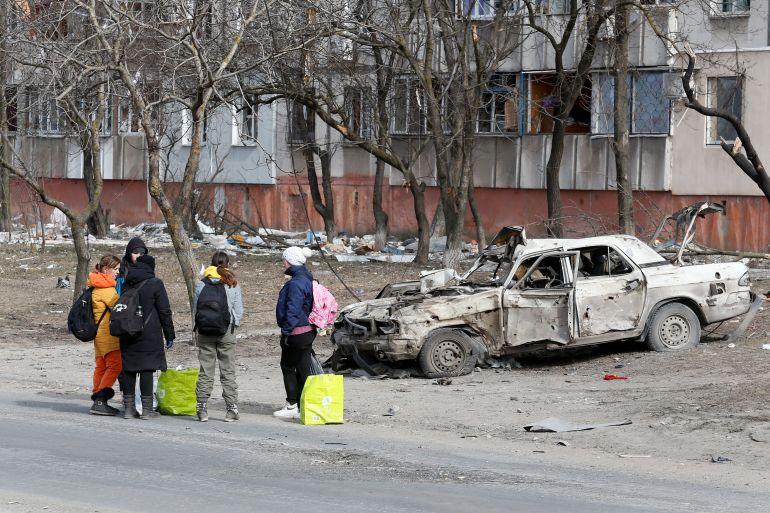Ukraine refuses to surrender besieged city of Mariupol
Mariupol continues to be bombarded by Russian forces, who also reportedly attacked Odesa for the first time.

Ukraine has rejected Russian calls to surrender the port city of Mariupol, where residents are besieged with little food, water, and power, in a humanitarian crisis that is increasing pressure on European leaders to toughen sanctions on Moscow.
Ukraine’s government said it would not accept Russian conditions that its forces lay down their arms in exchange for safe passage out of the city and humanitarian corridors to be opened from 10:00 Moscow time (07:00 GMT) on Monday.
Keep reading
list of 3 itemsFleeing Russia: ‘We were so afraid the border would close’
Ukraine’s Poroshenko urges Gulf countries to increase oil output
“There can be no question of any surrender, laying down of arms,” the Ukrainska Pravda news portal cited Ukraine’s Deputy Prime Minister Iryna Vereshchuk as saying.
“We have already informed the Russian side about this.”
Mariupol has suffered some of the heaviest bombardments since Russia invaded Ukraine on February 24. Many of its 400,000 residents remain trapped as fighting rages on the streets around them.
Vereshchuk said more than 7,000 people were evacuated from Ukrainian cities through humanitarian corridors on Sunday, more than half from Mariupol. She said the government planned to send nearly 50 buses there on Monday for further evacuations.
Russia and Ukraine have made agreements throughout the war to create humanitarian corridors to evacuate civilians, but have accused each other of frequently violating them.
Capturing Mariupol would help Russian forces secure a land corridor to the Crimean Peninsula, which Moscow annexed from Ukraine in 2014.
Meanwhile, Odesa’s mayor has accused Russian forces of carrying out an attack on residential buildings on the outskirts of the Black Sea port city, marking the first such reported attack there.
The city council said there were no casualties from the attack, although it had sparked a fire.
“Tense night” in Kyiv
Three civilians were killed and five were injured as a result of Russian shelling on Sunday in the east of the country, said Pavel Kirilenko, head of the Donetsk regional military administration. In the Kharkiv region, one person was killed and one injured, and in the Luhansk region, two were killed and one injured.
In the capital Kyiv, Mayor Vitali Klitschko reported several explosions in Podil district and said rescue teams were putting out a large fire at a shopping centre. He said at least one person was killed.
Al Jazeera’s Imran Khan, reporting from Kiyv, said it has been “yet another very tense night” for the Ukrainian capital’s residents.
“Throughout the night, we have been hearing air raid sirens and there have been bombings this morning, as well,” he said.
“A lot of people are sleeping in their corridors now, they just simply do not want to be near any glass windows, as what we see constantly is the façade of buildings being blown away completely as these rockets land,” Khan added.
Russian President Vladimir Putin has said Russia’s “special operation” is aimed at disarming Ukraine and rooting out dangerous nationalists. Western nations call it an aggressive war of choice and have imposed punishing sanctions aimed at crippling Russia’s economy.
The crisis in Mariupol and other devastated Ukrainian cities is likely to feature heavily in discussions between European Union leaders this week, as they consider imposing tougher sanctions on Russia, including an oil embargo.
US President Joe Biden will arrive in Brussels on Thursday for a NATO summit, as well as a European Council meeting.
Diplomats told the Reuters news agency that Baltic countries including Lithuania are pushing for an embargo as the next logical step, while Germany is warning against acting too quickly because of already-high energy prices in Europe.
Al Jazeera’s Hashem Ahelbarra, reporting from Moscow, says the absence of a breakthrough in talks between Russia and Ukraine until now indicates there has been “no progress whatsoever” on the key issues dividing the two sides.
Kyiv and Moscow had reported some progress last week towards a political formula that would guarantee Ukraine’s security, while keeping it outside NATO – a key Russian demand – though each side accused the other of dragging things out.